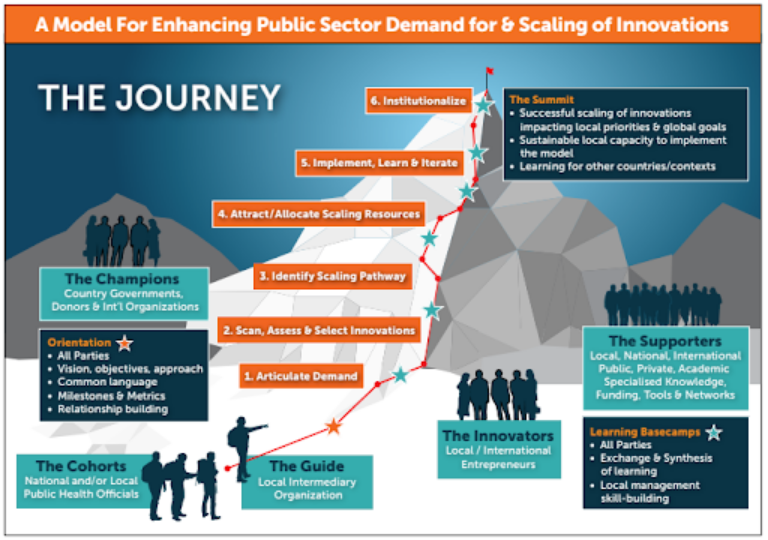WHO
The silent killer: why chronic respiratory disease deserves global attention
Multisectoral Action
25 Nov 2024
World Health Organization | 13 Nov 2023
From 14 to 16 November 2023, the World Health Organization’s Innovation Hub and the WHO Collaborating Centre for Health Innovations are co-hosting the landmark World Health Innovation Forum. Convening experts from around the world, the Forum explores multidisciplinary approaches to drive innovation in health service delivery, accessibility and quality to achieve health for all. WHO’s NCD Lab, a platform supporting promising grassroots innovations to achieve scale through knowledge collaboration, capacity-building and strategic partnerships, is participating at the forum at a dedicated panel and an information stand.
The Forum’s 3-day programme is based on the six stages of the Mountain Model for scaling up health innovations through the public sector. Created by the global nonprofit organization Results for Development (R4D), the model aims to support national and local governments in low- and middle-income countries to scale innovations that are aligned with their health priorities. Using the metaphor of climbing a mountain, the model highlights the different kinds of support governments need and interventions required at key points along the demand and scaling journey.

R4D’s six-stage Mountain Model (↗)
As the world’s biggest causes of death and disability, innovative approaches are urgently needed to respond to noncommunicable diseases (NCDs), such as cancer, diabetes, cardiovascular disease, chronic respiratory diseases and mental health conditions. NCDs are also an issue of equity - of the 41 million people dying from NCDs every year, three-quarters lived in low- and middle-income countries.
The need to continue scaling proven, cost-effective interventions, such as the NCD “best buys” remains a priority, but this will not be enough to avert millions of preventable deaths from NCDs every year.
Innovative solutions in digital health can fast-track relief for overburdened health systems and reach underserved populations. Novel ways to integrate NCD services in primary health care can increase access to life-saving early detection and screening services to billions of people living with NCDs. New, multisectoral approaches linking the prevention of NCDs with their economic, environmental, political, social and cultural determinants promise to reduce longstanding inequities in health outcomes. Across all NCD policies and programmes, local communities and people living with NCDs must be meaningfully engaged in determining the types of services they most need.
The majority of innovations in global health are led by or already have the trust and support of governments and industries. But grassroots innovations – solutions that spring directly from underserved communities that are most affected by NCDs – do not get the attention they deserve. The NCD Lab, launched by the WHO Global Coordination Mechanism on NCDs (GCM/NCD), is a multistakeholder platform that identifies promising grassroots innovations that tackle the complex burden of NCDs and connects them with the innovation ecosystem within and beyond WHO. Through annual calls, the NCD Lab seeks innovations that are designed by and for local communities, and best respond to urgent country priorities. These innovations are then supported on their journey to scale through capacity-building workshops, expert dialogues, speaking opportunities at global forums, strategic partnerships, and knowledge and communication resources.
At a session during the Forum on scaling sustainable primary health care innovations, Dr Guy Fones, Head of the GCM/NCD, will highlight why grassroots innovations are needed to accelerate progress on NCD targets and integrate NCD services into primary health care services. He will also share lessons learned from the NCD Lab in terms of how governments can identify grassroots innovations and support them on their journey to scale.
The Forum will explore how the public sector can be engaged to scale up health innovations in their countries and communities to ensure we can ultimately ‘leave no one behind’ in the SDG promise of health and wellbeing for all. Strategies and insights shared are expected to enhance the up-take of heath innovations by the public sector and guide all actors in the health innovation ecosystem to partner more effectively with governments.